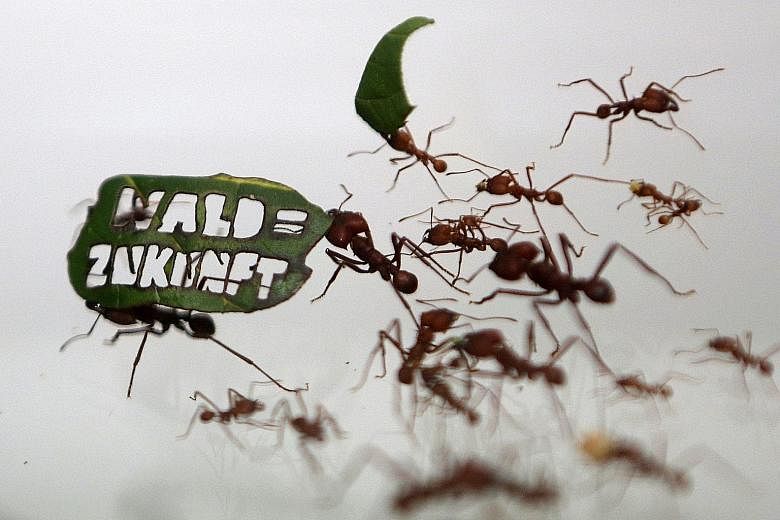TORONTO • Tropical forests covering an area nearly the size of India are set to be destroyed in the next 35 years, a faster rate of deforestation than previously thought, a study has warned.
The Washington-based Centre for Global Development, using satellite imagery and data from 100 countries, predicted that 289 million ha of tropical forests would be felled by 2050. The results will have dangerous implications for accelerating climate change, the centre's study said on Monday.
Deforestation contributes to climate change as forests store carbon while acting as a filter taking the heat-trapping carbon dioxide gas out of the atmosphere. If current trends continue, tropical deforestation will add 169 billion tonnes of carbon dioxide into the atmosphere by 2050, the equivalent of running 44,000 coal-fired power plants for a year, the study's lead author said.
"Reducing tropical deforestation is a cheap way to fight climate change," said environmental economist Jonah Busch. He recommended taxing carbon emissions to push countries to protect their forests.
UN climate change experts estimate the world can burn no more than one trillion tonnes of carbon in order to keep global temperature rises below 2 deg C, the maximum possible increase to avert catastrophic climate change. If trends continue, the amount of carbon burnt as a result of clearing tropical forests is equal to roughly one-sixth of the entire global carbon dioxide allotment, Dr Busch said. He added: "The biggest driver of tropical deforestation by far is industrial agriculture to produce globally-traded commodities, including soya and palm oil."
The study predicted that the rate of deforestation will rise until 2020 and 2030 and accelerate around the year 2040 if changes are not made.
There have been some success stories where countries reduced tropical deforestation without compromising economic growth or food production, the study said. Brazil decreased deforestation in the Amazon rainforest by 80 per cent over a decade through the use of satellite monitoring and increased law enforcement, even as cattle and soy production rose, the study said.
Another study has said the diverse ecosystem of the world's remaining tropical forests will be simplified, leading to mass species loss, due to human action.
The study, released last Friday, by the University College London, and published in the journal Science, suggests that the impact of humans on these areas has been increasing for millennia. Today, more than three- quarters of the world's remaining tropical forests have been degraded by human actions. "I fear a global simplification of the world's most complex forests... As the climate rapidly changes, the plants and animals living in the rainforest will need to move to continue to live within their ecological tolerances," said the study's lead author, Dr Simon Lewis.
The world is seeing a much greater impact from human actions today, with distant decision-makers directing how land is used, including permanent intensive agriculture, frontier industrial logging for timber export and cross-continental species invasions.
The researchers term this phase the era of "global integration", affecting even the most remote areas.
According to the study, current trends look set to intensify without major policy changes as global food demand is projected to double, over 25 million km of roads are predicted to be built by 2050 and climate change escalates.
REUTERS, XINHUA

